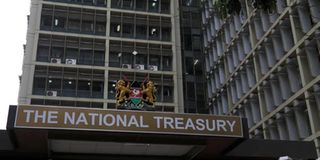Go for dollar loans, experts urge Treasury

The National Treasury building in Nairobi. FILE PHOTO | SALATON NJAU | NATION MEDIA GROUP
What you need to know:
- Financial analysts say time is ripe for the National Treasury to access cheap dollar debt on the international market.
Financial analysts say the time is ripe for the National Treasury to access cheap dollar debt on the international market, after Ghana issued a $750 million Eurobond on Thursday at a yield of 9.25 per cent.
Accra badly needed cash to balance the budget before elections in December, but had been unable to raise funds, even aborting an attempt to launch the bond in August because investors were demanding higher than expected yields.
Analysts see last week’s sale that was oversubscribed, with orders exceeding $4 billion as a master stroke of good timing post Brexit.
“Kenya needs to take this opportunity with both hands and immediately. Kenya has seen yields on its 10-year dollar euro bond fall dramatically to just around 7 per cent, this is an outstanding level (add 50 basis points for a concession and you get a rate around 7.6 per cent) for the Treasury CS to fill his boots,” said Mr Aly-Khan Satchu CEO of advisory firm Rich Management Ltd.
The International Monetary Fund Country Representative Armando Morales told Bloomberg news that Kenya must get all the financing it needs well ahead of elections, analyse the Fed very carefully and be prepared to act on the sale as soon as the market allows.
Kenya, which hinted that it would go into the international market to raise a Eurobond soon, also faces the threat of a rise in United States interest rate, which could happen this month during the Federal Open Market Committee meeting.
Mr Satchu, however, said that at 9.25 per cent, Ghana’s bond could push up bond yields for emerging economies. The international market treats most African countries as peers, with Ghana’s rate an indication of the price investors would pay for an African bond.
Yields on Kenya’s Eurobond securities due 2024 fell to 7.12 last month, although analysts see the market demanding upwards of 8 per cent if Nairobi were to go back to the market.





